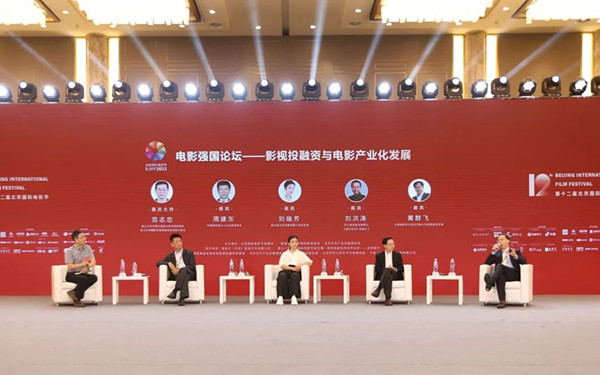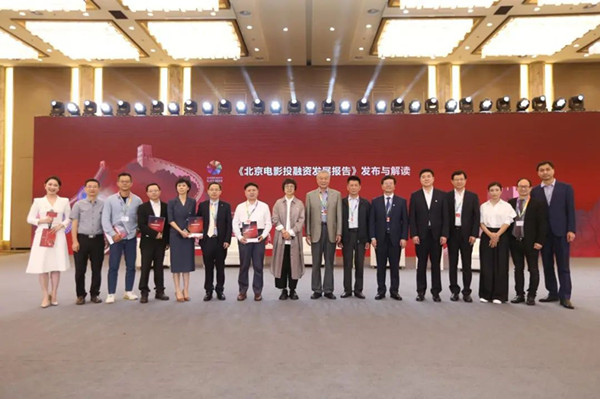Chinese film industry in urgent need of money, say experts
- By Zhang Rui
 0 Comment(s)
0 Comment(s) Print
Print E-mail China.org.cn, August 20, 2022
E-mail China.org.cn, August 20, 2022
Top executives and experts gather at a forum during the 12th Beijing International Film Festival (BJIFF) to share their insights about the pivotal element of the Chinese film industry – the money, which the industry severely needs in order to witness a renaissance.

"The Chinese film industry is facing a critical and difficult moment and especially needs the support of financial capital. The Chinese film market increased by 48.6% in 2015. At that time, Chinese investors raced to invest in the film business regardless of the cost, but today, we very much lack money!" said Rao Shuguang, president of the China Film Critics Association, at the 12th BJIFF China Film Investment and Financing Summit convened on Aug. 15.
Even "Moon Man," the sci-fi comedy which had already grossed more than 2.5 billion yuan by Tuesday, was in urgent need of money before the project began. "When the film was initiated, it was when COVID-19 broke out. Everyone was worried about the future and uncertainties, and we had spent most of our money on another film, so we were very anxious," revealed Liu Hongtao, president of Mahua FunAge. They tried to secure loans from banks, but the banks hesitated. Luckily, China Film Group and Alibaba Pictures came to his aid and made it happen.
"For banks, the money is not windfall; why should they have to invest in an industry with uncertainties?" Liu asked and reflected. "'Moon Man' would need five years to make, to screen, and finally earn money back. From a financial point of view, how to speed up the flow of funds also needs to be discussed."
Also, he pointed out, China films relied too heavily on box office revenues. "But a mature film industry can trade copyrights and sell merchandise to balance a film's investment and financing. I hope, in the future, we can have better industrialization and open sources for other revenues for our industry."
Huang Qunfei, executive deputy general manager of Huaxia Film Distribution Co., Ltd., said he felt that this year was the most difficult for the Chinese film market.
"The biggest problem is the lack of content supply," Huang said. According to him, only six or seven theatrical films started filming in June and July. Even for the project registry at China's film authorities, the number of registrations in April decreased by 75 projects compared with last year, and in May, the number of registrations decreased by 71 year on year. "If the projects are so few this year, what should we do next year?"
As China's film market began to recover, the Chinese box office this summer reached 8 billion yuan as of Aug. 19, surpassing the total revenue for last summer's movie season, according to the China Film Administration. To promote film consumption, the administration will also issue coupons and vouchers valued at 100 million yuan through various platforms. For Huang, these are the positive side of the story: the fundamentals of the film market are still there.
He noted that the content is the most important thing for investment. "I hope the ventures will invest in not only the big-budget films, but also the small and middle-sized budget films to create diversity and promote the prosperity of the Chinese film market. Then we can have a future."
Ye Ning, the film business partner at Zhewen Pictures Group, believed those with capital still have confidence in the film industry. For example, Dai Wei, assistant president of the Bank of Beijing, told the audience at the forum that the bank has offered 26 billion yuan in loans to more than 1,000 film-related enterprises so far.
"But the lack of a sustainable business model is also a big problem. If we improve ourselves in every detail, the capital will continue to help us," Ye said, noting the most urgent thing in China now is to empower young filmmakers with all the resources to help them create excellent Chinese stories on the screen one after another.

Jiang Defu, executive president of Bona Film Group, which made its debut on the Shenzhen stock exchange on Thursday, remembered how he felt he did not need to worry about the future after two episodes of "The Battle at Lake Changjin" were made and went on to gross nearly 10 billion yuan. "We coordinated those big-shot directors and 7,000-strong crew for the film. We had never done that before. But when we started to do new films, new challenges still arose. So filmmaking is always challenging, and we should have confidence in Chinese films."
Liu Ruifang, CEO of the Joy Leader Culture and Communication, appealed to investors on the sidelines that now is the best time to invest. "After three years of the pandemic, those who stay and are willing to continue to take root in the film industry are the elites of the industry. They are worthy of investment. It is also the best time to gradually mature and move towards an open and cooperative mentality."






Go to Forum >>0 Comment(s)